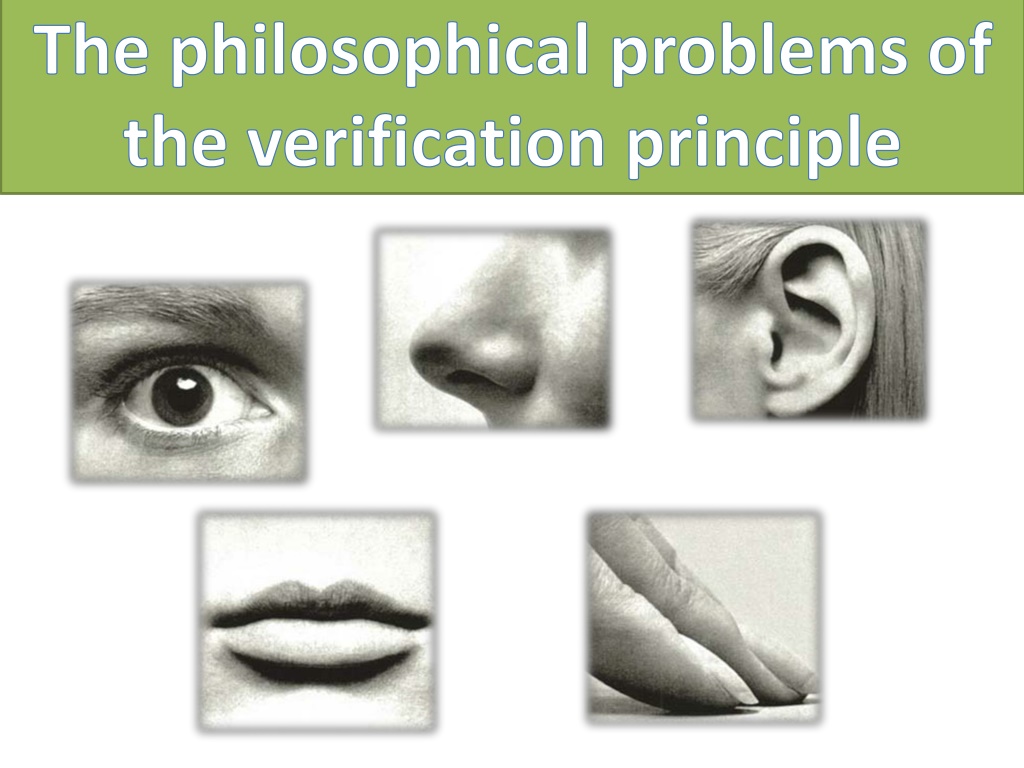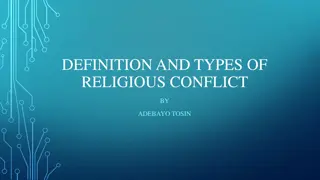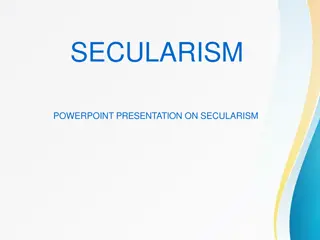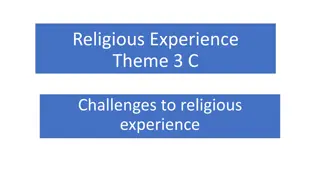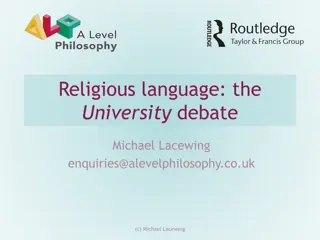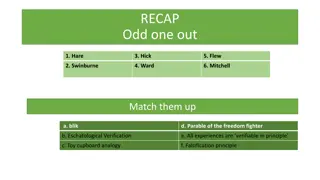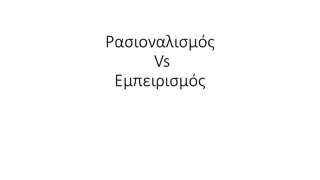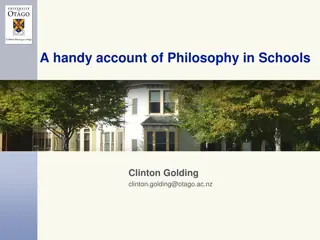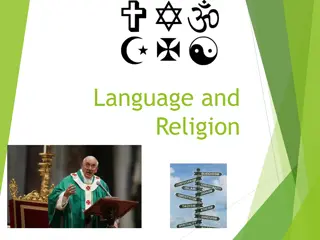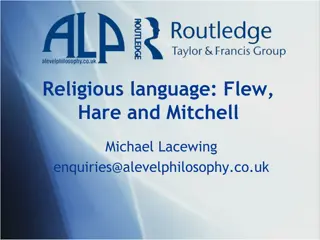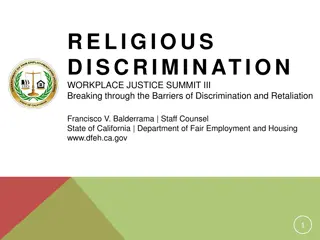The Philosophical Problems of Religious Language
Explore the challenges and debates surrounding religious language, specifically focusing on the verification principle, cognitive vs. non-cognitive aspects, and the meaningfulness of statements about God. Delve into the perspectives of religious believers and Logical Positivists, along with the influence of philosophers like Ludwig Wittgenstein on the meaning of language.
Download Presentation

Please find below an Image/Link to download the presentation.
The content on the website is provided AS IS for your information and personal use only. It may not be sold, licensed, or shared on other websites without obtaining consent from the author.If you encounter any issues during the download, it is possible that the publisher has removed the file from their server.
You are allowed to download the files provided on this website for personal or commercial use, subject to the condition that they are used lawfully. All files are the property of their respective owners.
The content on the website is provided AS IS for your information and personal use only. It may not be sold, licensed, or shared on other websites without obtaining consent from the author.
E N D
Presentation Transcript
The philosophical problems of the verification principle
Knowledge test 1. What A2 exam is religious language on? Unit 3 or 4 2. What is meant by the term cognitive? 3. What is the problem with claiming religious language is cognitive? 4. Define objective 5. Define subjective 6. What is meant by anthropomorphic? 7. Name one other problem with defining God? 8. Why is it difficult to understand the phrase God is love ?
What are the problems with religious language? I am the good shepherd I am the bread of life I am the light of the world I am the resurrection and the life These are all statements recorded in the Gospel of John that Jesus made about himself. I am the resurrection Questions 1. Would any of these help you to understand Christian ideas about God? 2. What are the problems?
Pyramid activity on the problems with religious language Which is the most serious problem with religious language? Most serious Suggestions Cognitive Non cognitive Anthromorphises Emotions/feelings Interpretation Transcendent God Least serious
The key role of Religious Language is God-talk, that is, being able to talk about God in a meaningful and coherent manner. The problem arises when we consider what can be said about God? The religious language debate is not concerned with whether or not God exists, or what God is like or why there is evil in the world. It is solely concerned with working out whether or not religious language means anything. On the one side of the debate, you have the centuries old tradition of religious believers who believe that you can speak and write about God, because God is a reality. On the other side, are the Logical Positivists and those that they influenced who claim that statements about God have no meaning because they don t relate to anything that is real. Some philosophers have argued that religious statements, such as God exists , God is love and so on are neither true nor false, but meaningless. There is no point, according to some thinkers, of even raising these questions, because there is nothing to talk about. Philosophical discussion about meaning often identifies two different ways in which a word or phrase might mean something.
Background and influences complete the A3 sheet Ludwig Wittgenstein (1889-1951), one of the most remarkable philosophers of the twentieth century, raised the whole question of the meaning of language, and inspired debates across the world: people were asking what the necessary conditions for something to have any meaning at all might be, and how it is conveyed from one person to another in short they were discussing the meaning of meaning . He developed the Picture Theory - for words to have meaning they had to picture something in reality David Hume and empiricism We get all our knowledge from our sense experience. Why is this a problem for religious language? Science Can objectively test the truth of statements through observation and experiments
The Logical Positivists Wittgenstein was a strong influence on the Vienna Circle, a group of philosophers led by the writer Moritz Schlick who met throughout the 1920 s and 30 s. They held the belief that theological interpretations of events and experiences belonged in the past, to an unenlightened age when God was used as an explanation for anything that science had not yet completely mastered. Leaving God as the god of the gaps . They believed that any discussion about anything that could not logically (and by use of the senses) be proven (verified)to be true (positive) was meaningless. Thus, Logical Positivism.
Discuss the following statements: 1. Jenny s car is blue. 2. There is a small hobbit sat under my desk that becomes invisible when anyone looks at it, can move quicker than any human who tries to touch it and never makes a sound. 3. 2 + 2 = 4 4. All humans are mortal. 5. A bachelor is an unmarried man 6. There is life on other planets. 7. It is currently snowing at the South Pole. How can these statement can be verified?
What does the Verification Principle think is meaningful language? Analytic Statement True by definition (tautology) and cannot be false a priori statements which are true because the wording of the statement verifies its truth e.g. The widow was once married , the circle is round . Mathematical Statements 5 + 5 does add up to 10, if it adds up to 9 then a simple recalculation would solve the issue. Synthetic Statements a posterioristatements which can be verifiable or falsified through empirical evidence e.g. It is currently snowing at the South Pole . These statements are considered meaningful as they can, in theory, hold verifiable or falsifiable truths. Which of these statements would be meaningful: 1. Dogs bark 2. Quadrupeds have four legs 3. There is life on other planets 4. Ice cream is cold 5. I love my children
Implications for religious language The Vienna Circle concluded that religious statements were meaningless, on the basis that they do not satisfy any of these criteria, because religious language claims are subjective and cannot therefore be empirically tested and verified In Language, Truth and Logic (Penguin, 1936), A J Ayer observed that, since the existence of God cannot be rationally demonstrated, it is not even probable, since the term god is a metaphysical term referring to a transcendent being which cannot therefore have any literal significance. Question: What is meant by probable ? As such, Ayer observed that the same had therefore to be the case for atheistic and agnostic statements, since any statement which includes the term god is meaningless. Ayer argued that, since claims about God s existence cannot be contradicted, they are not significant propositions they are neither true nor false, but cannot be valid. The notion of a being whose essential attributes are non- empirical is not an intelligible notion at all .
Implications for religious language Ayer was not simply concerned with talking about God, but also with all other religious language, including: Talk of an after life, which cannot be verified either. Talk of a soul he dismissed as meaningless since it is a metaphysical assertion to say that there is something imperceptible inside a man, which is his soul or his real self, and that it goes on living after he is dead . Talk of religious experience was also soundly dismissed by Ayer as being talk of experience which cannot be validated empirically: The fact that people have religious experiences is interesting from the psychological point of view, but it does not in any way imply that there is such as thing as religious knowledge .
Discuss the following statements. What issues arise for the logical positivists? All ravens are black The view from my hotel window is beautiful The Battle of Hastings took place in 1066
Verificationism does not allow for statements that are not either empirically verifiable or tautologies. Such statements are considered as meaningless, by which they mean the statement literally has no meaning in a factual sense. As a result, statements regarding beauty or expressing a preference are meaningless. The beauty of a piece of art, a view, or a person cannot be decided on the basis of observation, nor can it be answered true or false
Problems with the verification principle Richard Swinburne in God-talk is Not Evidently Nonsense challenges verificationism giving the example All ravens are (at all times) black . Swinburne points out that whilst people generally accept ravens are black, there is no way to ever confirm this statement, as however many ravens you look at there is always the possibility of there being one more raven that is not black. Therefore, according to verificationism, the statement is meaningless. A further problem lies with historical events and statements made about them. Saying the battle of Hastings happened in 1066 is not verifiable by us using our sense experiences and observations.
Ayers response to the problems A.J. Ayer firstly clarified what was meant by meaningless, this being a statement that is not factually significant (Language, Truth & Logic). Ayer was not denying that people make statements that are important to them, such as God answers my prayers they are just unverifiable so have no factual significance. So, how do you verify a proposition? Practical Verifiability and Verifiability in Principle Practical verifiability refers to statements that can be tested in reality. If I said England Rugby team wear purple shirts this is verifiable in practice Strong VP However, if I said there is life on other planets in the our galaxy this is meaningful and verifiable in principle, but in practice we lack the technical ability to visit every planet and look for life Weak VP
Strong and Weak Verification Ayer distinguished between strong and weak verification. Strong verification applied anything that can be verified conclusively using empirical evidence e.g. What are the problems with this? Ravens, history, generalisations Weak verification refers to statements that are verifiable in principle, this means that I would know what I would have to do in order to verify it. What sort of statements would this allow? Ayer suggested weak verification should be form used as strong verification has no real application e.g. All humans are mortal .
Q. Can the traditional a posteriori arguments for the existence of God (the cosmological and teleological arguments) be subject to verification? Why/How? For we shall maintain that no statement which refers to a reality transcending the limits of all possible sense-experience can possibly have any literal significance. As such, the efforts of those who have striven to describe such a reality have all been devoted to the production of nonsense. Q. Can metaphysical statements be subject to verification? Why/How? Q. Are our five senses the only true way we can verify a statement? Discuss. Ayer s Language, Truth & Logic was criticised by a number of philosophers, as such he published a second edition. In it he concluded that his distinction between SV & WV was not a real distinction. SV could not refer to basic statements of single experiences verified by their occurrence. He also saw WV as far too liberal allowing meaning to any statement whatsoever.
The verification principle: Complete tasks 9 to 15 Homework learn todays work for a test tomorrow A.J.Ayer http://A.J.Ayer on Logical Positivism
